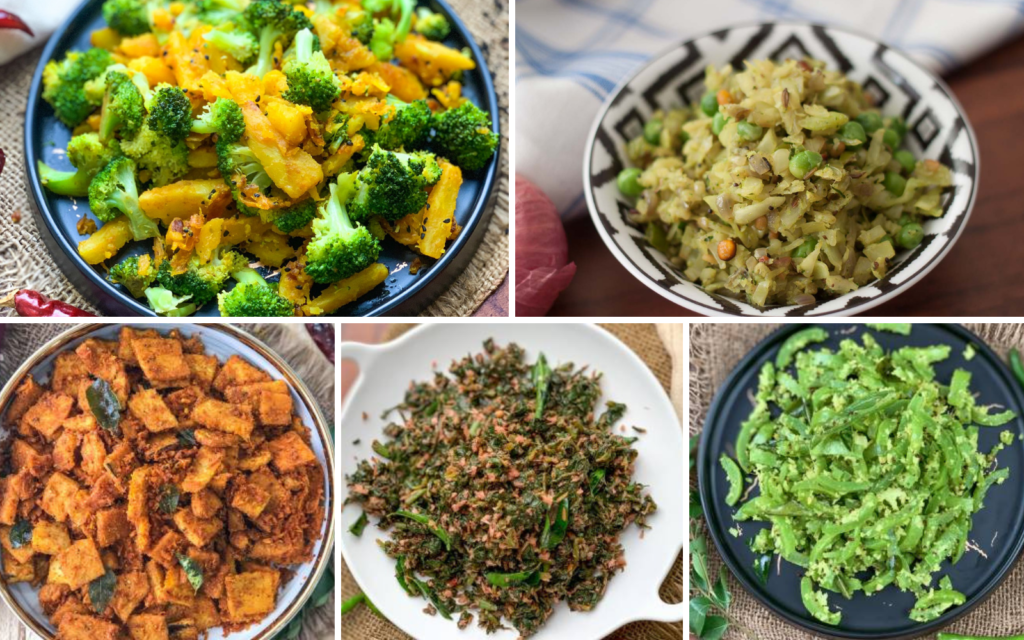
Table of Contents
Vegetarian food ( introduction )
A vegetarian diet is a dietary pattern that is deeply rooted in Indian culture and has been practiced for centuries. Indian cuisine offers a rich and diverse array of vegetarian dishes that are not only flavorful but also nutritionally balanced. Vegetarianism in India is influenced by various factors, including religious beliefs, cultural traditions, and the abundance of plant-based ingredients.
Indian vegetarian diets encompass a wide range of foods, flavors, and cooking techniques that cater to a variety of tastes and preferences. Some key aspects of vegetarian diets in Indian cuisine include:
- Diverse Plant-Based Foods: Indian cuisine incorporates an impressive variety of legumes, lentils, grains, vegetables, fruits, nuts, and seeds. This diversity ensures that vegetarians can access a wide range of nutrients, including protein, fiber, vitamins, and minerals.
- Spices and Flavors: Spices play a crucial role in Indian cooking, not only enhancing the taste of dishes but also offering potential health benefits. Turmeric, cumin, coriander, cardamom, and ginger are just a few examples of spices commonly used in Indian vegetarian recipes.
- Cultural and Religious Significance: In India, vegetarianism is deeply intertwined with religious beliefs, particularly in Hinduism, Buddhism, and Jainism. Many followers of these religions choose vegetarian diets as a way to show respect for all forms of life.
- Plant-Based Protein Sources: Legumes like lentils, chickpeas, and black beans are staple protein sources in Indian vegetarian diets. These provide essential amino acids and are often paired with grains like rice or wheat to create complete protein profiles.
- Dairy Products: Dairy plays a significant role in Indian vegetarian cuisine, with ingredients like paneer (Indian cottage cheese) and yogurt being integral to many dishes. However, vegan alternatives are also becoming more popular.
- Regional Variations: India’s diverse regions contribute to a wide range of vegetarian dishes that reflect local ingredients and cooking traditions. From dosas in the south to chole bhature in the north, each region offers unique flavors and specialties.
- Street Food and Snacks: Indian street food culture is brimming with vegetarian options. Chaats, samosas, pakoras, and bhel puri are just a few examples of popular vegetarian snacks enjoyed across the country.
- Ayurvedic Principles: Ayurveda, an ancient Indian system of medicine, emphasizes the importance of balancing the body through diet and lifestyle. Many Indian vegetarian dishes align with Ayurvedic principles of using seasonal, whole, and fresh ingredients.
- Health Benefits: A well-balanced Indian vegetarian diet can provide a range of health benefits, including weight management, reduced risk of chronic diseases, and improved digestion.
Indian vegetarian cuisine exemplifies how plant-based foods can be creatively prepared to yield both nutritional value and culinary delight. Whether you’re seeking traditional comfort foods or innovative plant-based creations, Indian vegetarian cuisine has something to offer for every palate.
also read aboutOdisha Food: Exploring the Delights of Traditional Odia Cuisine
Vegetarian diets
Vegetarian diets
A vegetarian diet is a dietary pattern that primarily excludes the consumption of meat and sometimes other animal products. People choose vegetarian diets for various reasons, including health, ethical, environmental, and cultural factors. There are several types of vegetarian diets, each with its own level of restriction:
- Lacto-Ovo Vegetarian: This is the most common type of vegetarian diet. It excludes meat, poultry, and fish but includes dairy products (lacto) and eggs (ovo).
- Lacto-Vegetarian: Similar to the lacto-ovo diet, this excludes meat, poultry, and fish, but only includes dairy products, not eggs.
- Ovo-Vegetarian: This diet excludes meat, poultry, fish, and dairy products, but includes eggs.
- Vegan: Vegans avoid all animal products, including meat, poultry, fish, dairy, eggs, and any products derived from animals, such as honey. They also avoid non-food items like leather and wool.
- Pescatarian: While not a strict vegetarian diet, pescatarians exclude meat and poultry but include fish and seafood in their diet.
- Flexitarian/Semi-Vegetarian: This is a flexible approach where individuals primarily follow a vegetarian diet but occasionally include meat or other animal products.
Benefits of Vegetarian Diets:
- Health: Well-balanced vegetarian diets can provide various health benefits, such as reduced risk of heart disease, diabetes, certain cancers, and obesity. They often include a higher intake of fruits, vegetables, whole grains, and plant-based proteins.
- Environmental: Producing plant-based foods generally has a lower environmental impact in terms of greenhouse gas emissions, land use, and water consumption compared to animal agriculture.
- Ethical: Many people choose vegetarian diets to avoid contributing to animal suffering and promote animal welfare.
- Cultural/Religious: Some cultural or religious beliefs advocate for vegetarianism as a way to show respect for living beings or as a form of fasting or self-discipline.
Challenges and Considerations:
- Nutritional Balance: Vegetarian diets can lack certain nutrients such as vitamin B12, iron, calcium, omega-3 fatty acids, and protein. However, with proper planning and food choices, these nutrients can be obtained from plant-based sources or supplements.
- Protein Sources: Plant-based protein sources include legumes, tofu, tempeh, seitan, nuts, seeds, and whole grains.
- Meal Planning: A well-balanced vegetarian diet requires careful planning to ensure you’re getting all the necessary nutrients.
- Cultural Considerations: Different cuisines have varying vegetarian options, and some regions may find it more challenging to adhere to a vegetarian diet due to cultural norms and availability of plant-based foods.
Before making any significant dietary changes, it’s recommended to consult with a healthcare professional or a registered dietitian to ensure that you’re meeting your nutritional needs while following a vegetarian diet.
Indian vegetarian food

Indian vegetarian food is renowned for its rich flavors, diverse ingredients, and vibrant culinary traditions. It reflects the country’s cultural, religious, and geographical diversity. Here are some key features of Indian vegetarian cuisine:
- Plant-Based Variety: Indian cuisine offers an extensive array of vegetarian dishes that include vegetables, legumes, grains, dairy, and a wide range of spices and herbs.
- Spices and Flavors: Spices are the heart of Indian cooking, providing layers of flavor and aroma to dishes. Common spices include turmeric, cumin, coriander, cardamom, cinnamon, and more.
- Regional Diversity: India’s diverse regions contribute to a wide range of vegetarian dishes. Each region has its own specialties, ingredients, and cooking techniques.
- Staple Foods: Rice and wheat are staple grains in Indian cuisine, forming the basis of dishes like rice biryani, roti (flatbread), dosa (fermented crepe), and idli (steamed rice cake).
- Legumes and Pulses: Lentils, chickpeas, kidney beans, and other legumes are essential protein sources in Indian vegetarian diets. They’re used to make dals (lentil soups) and curries.
- Dairy Products: Dairy plays a significant role in Indian cooking, with yogurt, ghee (clarified butter), paneer (cottage cheese), and various milk-based sweets being integral to many dishes.
- Street Food Culture: India’s street food scene offers a treasure trove of vegetarian options, including samosas (fried pastry filled with spiced potatoes), pakoras (deep-fried fritters), and chaats (spiced snacks).
- Vegetable Diversity: With an abundance of vegetables available year-round, Indian cuisine boasts a variety of vegetable-based dishes prepared in a multitude of ways, from stir-fries to curries.
- Snacks and Sweets: Indian vegetarian cuisine includes an array of snacks and desserts, such as jalebi (syrup-soaked sweet), gulab jamun (milk-based dumplings), and kheer (rice pudding).
- Balanced Nutrition: Traditional Indian meals are often balanced, combining various food groups to ensure a diverse nutrient intake. This can include vegetables, legumes, grains, dairy, and fruits.
- Ayurvedic Influence: Many Indian dishes are prepared according to Ayurvedic principles, which emphasize the balance of flavors, energies, and nutrition to promote well-being.
- Fasting and Religious Practices: Vegetarianism is deeply rooted in Indian religions. Many people follow vegetarian diets during religious festivals or specific fasting periods.
- Global Influence: Indian vegetarian cuisine has influenced vegetarian cooking worldwide, with dishes like curry and masala becoming popular internationally.
Indian vegetarian food is celebrated not only for its taste and variety but also for its potential health benefits. While enjoying this cuisine, it’s important to ensure balanced nutrition by including a wide range of foods and paying attention to nutrient intake, especially for vitamins and minerals that might be lacking in a solely plant-based diet.
Vegetarian dishes from various foreign countries
Here are some examples of vegetarian dishes from various foreign countries:
- Italy – Pasta Primavera: A colorful dish featuring pasta and a variety of sautéed or roasted vegetables, often served with a light olive oil or tomato-based sauce.
- Mexico – Vegetable Enchiladas: Tortillas filled with a mix of sautéed vegetables, beans, and cheese, topped with salsa and baked until bubbly.
- Thailand – Thai Green Curry with Tofu: A fragrant curry made with coconut milk, green curry paste, tofu, and an assortment of vegetables.
- Japan – Vegetable Sushi: Sushi rolls filled with ingredients like cucumber, avocado, carrot, and pickled radish, served with soy sauce and wasabi.
- Lebanon – Hummus and Falafel: Creamy chickpea-based hummus served with crispy falafel (deep-fried chickpea patties), pita bread, and a variety of salads.
- India – Aloo Gobi: A North Indian dish featuring potatoes (aloo) and cauliflower (gobi) cooked with spices to create a flavorful curry.
- Ethiopia – Injera with Lentil Stew: Injera, a spongy flatbread, served with a lentil stew called “Mesir Wot,” often accompanied by other vegetable-based stews.
- Greece – Greek Salad: A refreshing salad made with tomatoes, cucumbers, olives, red onions, and feta cheese, drizzled with olive oil and sprinkled with oregano.
- Vietnam – Fresh Spring Rolls: Rice paper rolls filled with a combination of fresh herbs, rice vermicelli, tofu or shrimp, and other vegetables, served with dipping sauce.
- Egypt – Koshari: A popular Egyptian dish made with a mixture of rice, lentils, macaroni, and chickpeas, topped with a spicy tomato sauce and fried onions.
- Spain – Vegetable Paella: A flavorful rice dish cooked with saffron, vegetables like bell peppers and peas, and sometimes beans or artichokes.
- Turkey – Imam Bayildi: A Turkish dish of eggplant stuffed with onions, garlic, tomatoes, and spices, often served as a warm appetizer.
- South Korea – Bibimbap: A bowl of rice topped with assorted vegetables, often including sautéed spinach, carrots, bean sprouts, and a fried egg, served with spicy sauce.
- Jamaica – Vegetable Curry: A spiced curry made with coconut milk, yams, potatoes, and various vegetables, served with rice and beans.
- France – Ratatouille: A Provençal vegetable stew made with eggplant, zucchini, bell peppers, onions, and tomatoes, seasoned with herbs and olive oil.
These are just a few examples of the diverse and delicious vegetarian dishes you can find from around the world. Exploring international vegetarian cuisines allows you to enjoy a wide variety of flavors, ingredients, and culinary traditions.
15 Advantages of vegetarian food
15 Advantages of vegetarian food
Certainly, here are 15 advantages of vegetarian food:
- Heart Health: Vegetarian diets tend to be lower in saturated fats and cholesterol, reducing the risk of heart disease.
- Weight Management: Vegetarian diets are often high in fiber and lower in calorie-dense foods, making weight management easier.
- Reduced Chronic Diseases: Vegetarian diets can lower the risk of type 2 diabetes, certain cancers, and hypertension.
- Digestive Health: High fiber content in vegetarian diets promotes healthy digestion and regular bowel movements.
- Environmental Impact: Plant-based diets have a smaller carbon footprint and use fewer resources, contributing to environmental sustainability.
- Animal Welfare: Choosing vegetarian foods supports ethical treatment of animals and reduces demand for factory farming.
- Diverse Nutrient Intake: Vegetarian diets encourage a variety of nutrient-rich foods, contributing to overall health.
- Ethical Considerations: Many individuals adopt vegetarian diets due to ethical beliefs about animal rights and cruelty.
- Longevity: Studies suggest that vegetarians may have longer life expectancy due to their dietary choices.
- Lower Risk of Obesity: Vegetarian diets can help prevent obesity due to their focus on whole, plant-based foods.
- Improved Blood Sugar Control: Vegetarian diets can help regulate blood sugar levels, reducing the risk of diabetes.
- Reduced Inflammation: Plant-based diets have been linked to lower levels of inflammation in the body.
- Better Gut Health: Vegetarian diets promote a diverse and beneficial gut microbiome.
- Cultural and Religious Alignment: Vegetarian diets align with the dietary practices of many cultures and religions.
- Vibrant Culinary Variety: Vegetarian cuisines from around the world offer diverse flavors and culinary experiences.
While these advantages highlight the positive aspects of vegetarian food, it’s important to remember that a well-balanced diet is key. To ensure proper nutrition, it’s recommended to plan meals carefully, include a variety of nutrient-rich foods, and consider consulting with a healthcare professional or registered dietitian.
Disadvantages of vegetarian food
disadvantages of vegetarian food
While there are many benefits to vegetarian diets, there are also some potential disadvantages or challenges that individuals may encounter. It’s important to be aware of these aspects and address them to ensure a well-balanced and healthy vegetarian diet. Here are some potential disadvantages of vegetarian food:
- Nutritional Deficiencies: Without careful planning, vegetarian diets can lack certain nutrients that are more commonly found in animal products. These nutrients include vitamin B12, iron, calcium, omega-3 fatty acids, zinc, and complete proteins. It’s essential to choose a variety of plant-based foods and, if necessary, consider supplementation.
- Protein Sources: While plant-based protein sources are available, they may not always provide complete protein profiles with all essential amino acids. Combining different protein sources can help ensure adequate protein intake.
- Iron Absorption: Non-heme iron found in plant-based foods is not as easily absorbed by the body as heme iron from animal products. Consuming iron-rich foods along with vitamin C-rich foods can enhance iron absorption.
- Calcium Absorption: Plant-based sources of calcium (such as leafy greens and fortified plant milks) may have lower bioavailability compared to dairy sources. Adequate calcium intake and considering calcium-fortified foods can help address this concern.
- Vitamin B12 Deficiency: Vitamin B12 is primarily found in animal products, and deficiency can lead to anemia and nervous system issues. Vegans, in particular, should consider B12 supplementation or fortified foods.
- Digestive Concerns: Some high-fiber plant foods can cause digestive discomfort for certain individuals, especially if their digestive systems aren’t used to high-fiber intake. Gradually increasing fiber intake and staying hydrated can help manage this.
- Social and Cultural Challenges: Depending on cultural norms and social circles, adhering to a vegetarian diet may pose challenges during social events, family gatherings, and travel. Finding suitable options and communicating dietary choices effectively can help navigate such situations.
- Availability of Plant-Based Foods: In some regions, the availability of diverse plant-based foods and ingredients may be limited, making it challenging to maintain a varied and balanced vegetarian diet.
- Satiety and Energy Levels: Plant-based meals may have lower calorie density, which might affect satiety and energy levels for some individuals. Including adequate protein, healthy fats, and whole grains can help maintain energy balance.
- Personal Preferences: People have different tastes and preferences, and some individuals may find it challenging to transition to a vegetarian diet due to their affinity for meat or specific foods.
It’s important to approach a vegetarian diet thoughtfully and consider consulting a healthcare professional or registered dietitian before making significant dietary changes. With proper planning, education, and attention to nutrient intake, many of these potential disadvantages can be addressed effectively, and individuals can enjoy the benefits of a balanced vegetarian diet.
Advantages and disadvantages of vegetarian food explain details in table
advantages of vegetarian food and disadvantages of vegetarian food explain details in a table
| Advantages of Vegetarian Food | Disadvantages of Vegetarian Food |
|---|---|
| 1. Heart Health: Lower in saturated fats and cholesterol, reducing heart disease risk. | 1. Nutritional Deficiencies: May lack nutrients like vitamin B12, iron, and omega-3 fatty acids. |
| 2. Weight Management: High in fiber and low in calorie-dense foods, aiding weight control. | 2. Protein Sources: Plant proteins may lack some essential amino acids, requiring careful selection and combination. |
| 3. Reduced Chronic Diseases: Lower risk of diabetes, certain cancers, and metabolic syndrome. | 3. Iron and Calcium Absorption: Non-heme iron and calcium from plant sources may have lower bioavailability. |
| 4. Digestive Health: Rich in fiber, promoting healthy digestion and regular bowel movements. | 4. Vitamin B12 Deficiency: Limited in animal products, particularly concerning for vegans. |
| 5. Environmental Impact: Requires fewer resources, contributing to reduced greenhouse gas emissions. | 5. Digestive Concerns: High-fiber intake can cause gastrointestinal discomfort for some individuals. |
| 6. Animal Welfare: Avoids contributing to animal suffering in factory farming and other practices. | 6. Social and Cultural Challenges: May encounter challenges during social events or when dining out. |
| 7. Ethical Considerations: Aligns with beliefs in respecting all forms of life. | 7. Availability of Plant-Based Foods: Limited access to diverse plant-based ingredients in certain areas. |
| 8. Diverse Nutrient Intake: Encourages consumption of a variety of nutrient-rich plant foods. | 8. Satiety and Energy Levels: Meals might be lower in calorie density, affecting satiety for some. |
| 9. Longevity: Associated with potentially longer life expectancy. | 9. Cultural and Taste Preferences: Transition may be challenging for those accustomed to meat-based diets. |
| 10. Gut Microbiota: Supports diverse and beneficial gut bacteria, contributing to overall health. | 10. Nutrition Education: Requires learning about balanced vegetarian nutrition to avoid deficiencies. |
It’s important to remember that the advantages and disadvantages can vary based on individual factors, dietary choices, and how a vegetarian diet is planned and executed. Proper planning, variety, and attention to nutrient intake can help individuals experience the benefits of a vegetarian diet while mitigating potential drawbacks. Consulting with a healthcare professional or registered dietitian is recommended before making any significant dietary changes.
Conclusion
In conclusion, vegetarian food has gained recognition and popularity across the globe for its numerous advantages. It offers a range of benefits that contribute to personal health, environmental sustainability, ethical considerations, and cultural diversity. By opting for vegetarian diets, individuals can promote heart health, manage weight, and reduce the risk of chronic diseases. Additionally, vegetarian choices reflect compassion for animals and align with ethical beliefs regarding the treatment of living beings.
The environmental impact of vegetarian diets cannot be underestimated, as they require fewer resources and emit fewer greenhouse gases compared to diets centered around animal products. This makes vegetarianism a significant contributor to the global effort to mitigate climate change and conserve natural resources.
Culturally and religiously, vegetarianism holds deep significance in various societies, and it has influenced culinary traditions that are both flavorful and wholesome. From Mediterranean delights to Asian sensations, vegetarian dishes from around the world showcase the versatility of plant-based ingredients and the creativity of culinary artists.
However, it’s important to acknowledge potential challenges associated with vegetarian diets, such as ensuring adequate nutrient intake, addressing cultural and social situations, and addressing personal preferences. A balanced and well-informed approach is key to reaping the benefits of vegetarian food while addressing any potential drawbacks.
In conclusion, embracing vegetarian food allows individuals to make conscious choices that positively impact their well-being, the planet, and the lives of animals. Whether for health, ethical, or environmental reasons, the journey towards vegetarianism offers a path towards a healthier, more sustainable, and compassionate lifestyle.
FAQs
here are some frequently asked questions (FAQs) related to vegetarian diets:
- What is a vegetarian diet?
A vegetarian diet is a dietary pattern that excludes the consumption of meat, poultry, and seafood. It primarily focuses on plant-based foods such as fruits, vegetables, grains, legumes, nuts, and seeds. Some variations of vegetarian diets also allow for dairy and/or eggs. - What are the health benefits of a vegetarian diet?
A vegetarian diet can offer several health benefits, including reduced risk of heart disease, stroke, type 2 diabetes, certain cancers, and obesity. It can also contribute to improved digestion, better weight management, and lower blood pressure. - Can you get enough protein on a vegetarian diet?
Yes, it’s possible to get adequate protein from plant-based sources such as beans, lentils, tofu, tempeh, nuts, seeds, and whole grains. Combining a variety of these foods can provide all essential amino acids for protein synthesis. - What about essential nutrients like vitamin B12, iron, and calcium?
While some nutrients are more commonly found in animal products, they can be obtained from vegetarian sources or supplements. For example, vitamin B12 can be found in fortified foods or taken as a supplement, and iron-rich plant foods can be paired with vitamin C-rich foods to enhance absorption. - Is a vegetarian diet suitable for all life stages?
A well-planned vegetarian diet can be suitable for people of all life stages, including children, pregnant or breastfeeding women, and older adults. However, specific nutrient needs may vary, and it’s important to ensure balanced nutrition. - What are the different types of vegetarian diets?
There are several types of vegetarian diets, including:- Lacto-Ovo Vegetarian: Excludes meat and fish but includes dairy and eggs.
- Lacto-Vegetarian: Excludes meat, fish, and eggs but includes dairy.
- Ovo-Vegetarian: Excludes meat, fish, and dairy but includes eggs.
- Vegan: Excludes all animal products, including meat, dairy, eggs, and honey.
- Can a vegetarian diet help with weight loss?
Yes, a well-balanced vegetarian diet that is rich in fruits, vegetables, whole grains, and lean protein sources can support weight loss and weight management. - Are there cultural or religious reasons for following a vegetarian diet?
Yes, many cultures and religions have traditions of vegetarianism for reasons related to ethics, spirituality, and respect for life. - What are some challenges of following a vegetarian diet?
Challenges can include ensuring adequate nutrient intake (vitamin B12, iron, etc.), finding suitable options in social settings, and addressing personal taste preferences. - How can I transition to a vegetarian diet?
Gradually transition by introducing more plant-based foods into your diet, exploring new recipes, and educating yourself about balanced nutrition. Consulting a registered dietitian can provide personalized guidance.
Remember that individual dietary needs and preferences vary, so it’s important to make choices that align with your health goals and lifestyle. If you’re considering a significant dietary change, consulting a healthcare professional or registered dietitian can provide personalized advice and support.
https://en.wikipedia.org/wiki/Vegetarian_nutrition
read about how to earn money on Google👇







One thought on “15 Advantages of vegetarian food”